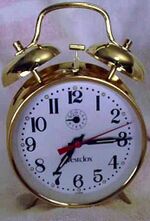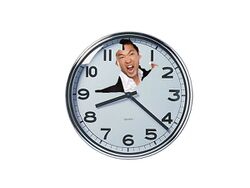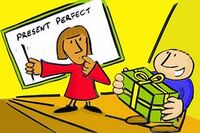Present
A present is a gift given in the present. A present in a present is called a presentpresent. Gifts which aren't given in the present, aren't called presents, but gifts, because they are given in the past.
A present[edit]
Right now we are in a present. On the present on the right for instance, it's 19:14. When it's 19:14, the 19:14 is a present, but the 19:12 is a past. An owner of a past, is called a pastafarian. Most pastafarians also believe in a flying spaghetti monster who lived in the past. Some pastafarians also have the belief that the past is made out of pasta.
Most presents are given presents intended for a birthday. Most people don't like to give presents, because they would give somebody extra time if they would give that person a present. So most people choose to not give a present, because it takes time for them to give a present. They prefer to give a gift instead of a present. Most presents consist of time, since they are a present. Although people like a present, they prefer a past, because they have more time if they have a time. There are problems with people who have amnesia, because they don't really know what a present is. If they try to think about it, they forget it.
Children seem to have better presents than most adults. Most adults are raped with TV-shows like FOX News and Wife Swap and by their children who steal their presents. Some adults decide to leave their kids, so they can have more time, adults are very attracted to presents.
A present outside of a present[edit]
Sometimes people don't include a present in a present, they want to look at the present, instead of putting it into a present, so they can see what the present looks like. Most presents not included into presents are very obvious, because they are present outside the box. Some people who think out of the box can really experience the present, that's the idea behind putting a present outside of a present. You can put it outside the box, so it is very doubtful if it's still a present. Most presents are presented without the present, because this stresses that they are a present. The present present, isn't considered to be in a present, because it's very obvious that this present can't be put in a present, than it wouldn't be obviously present anymore, but very hard to notice that it's present. This present though, isn't for sure a present in the form of a present, but could be an abstract representation of a present too.
A present inside of a present[edit]
Some presents are put inside a present. Most presents which are put into presents, are presents. Presents are presented to people, whom people want to give presents because they have a birthday or another kind of party. These people are really in for some time. Presents inside of presents are especially very popular in China, a famous proverb from the Chinese is: An ounce of gold will buy an inch of time.
Most people put presents into presents because they want to surprise other people. Most people who open presents, are surprised by the presents inside presents. Some Welshmen exclaim: 'No time to waste like the present.' when receiving one. Most Welshmen really hate presents, they think it's a waste of time, so that's why they say this when they receive presents.
Presents in history[edit]
In medieval times, most presents were given to a governor. Farmers didn't have a lot of time left, due to the presents which were given to governors. In the renaissance the presents got less popular, because people preferred to research the Antiquity and people who didn't have a lot of presents, like Plato and Aristotle. In the age of Enlightenment, most presents were less expensive, because people had more free-time after the French Revolution, the kings lost their presents and the peoples received presents. Even in America presents were popular, when Benjamin Franklin said 'Time is money', he actually referred to presents, because those are really expensive. In all time-periods, the Scots liked presents the most, that's why they say: 'That person is welcome who brings presents.' This is the reason why a lot of Irish weren't allowed to enter Scotland in the 18th and 19th century. Because they didn't really have got a lot of presents, due to the Great Famine, the Scots didn't really mind about the Irish because only the one who brings a lot of presents is allowed to enter Scotland and be present.
In the 20th century most people have a lot of presents. Especially in December when Santa Claus comes a lot of people receive presents.
Representing a present[edit]
Some people represent something. Most people who represent something, are doing this in the present, yet the present isn't represented. If a present were to be represented, it would be a future which contains a past, so that's quite strange. However, most representers are representing something which is in the present. Some people can for instance represent an article at Uncyclopedia, or even the holy symbol of Uncyclopedia, Sophia.
The present perfect[edit]
At the times when we have presented presents at Uncyclopedia, we were aware about the present situation. The present situation contains a lot of articles which are presented to us. The present perfect has contained perfect presents, because perfect presents are always given in the present perfect. The present perfect is a time which can change over time, and the present is an ideal situation to describe a piece of time which can change itself, so it is of course a perfect present. However perfect presents can be in the present, not all present perfects are in the present, actually, most present perfects are in the past. It's strange how a present perfect can be in the past, although it's called a present, this maybe has something to do with the word 'perfect' in it. Perfect refers to something which is marvelous, maybe some people think the present can be so perfect, that it isn't really a present anymore. It wouldn't have enough dignity if you referred to a present perfect just as a present...
Present perfects can contain presents, but they don't always contain presents. In some situations they do. For instance, when we've got the sentence:
- He has bought him a present.
We have got a present in the present perfect, but when we read:
- He didn't really care and hasn't bought it.
We don't have a present in the present perfect, we just have a word referring to a present.
However the present perfect can contain presents, it's just in certain sentences that it contains presents.




